Introduction to Psychological Assessments and IEP Eligibility
Psychological testing is a critical component in the process of determining a child's eligibility for special education services under IDEA. These assessments help identify specific disabilities, clarify underlying causes of learning or behavioral difficulties, and support the development of tailored educational plans. Both school-based and private evaluations are options, each offering unique insights that aid educators and parents in making informed decisions about the best supports for the child.
The Significance of Psychological Tests in Supporting IEP Eligibility
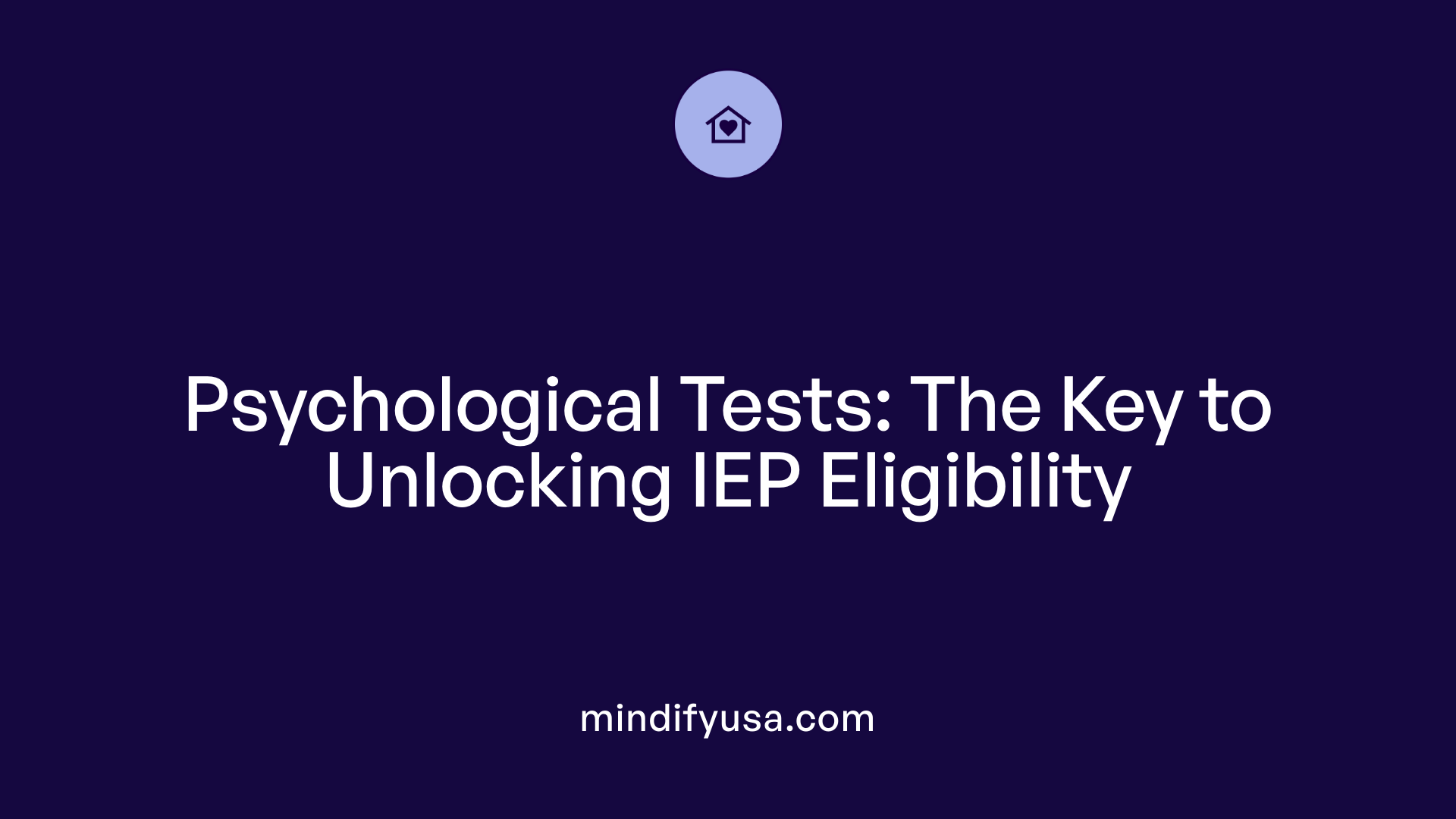
What is the role of psychological tests in supporting IEP eligibility?
Psychological tests are fundamental in the process of determining if a child qualifies for special education services through an Individualized Education Program (IEP). These assessments provide a detailed look into a student’s mental and emotional functioning, including their cognitive abilities, social-emotional health, and behavioral patterns.
By conducting psychological evaluations, professionals can identify specific learning disabilities, such as difficulties with reading, math, or written expression, as well as emotional or developmental disorders. These insights help clarify the underlying causes of academic struggles and behavioral issues, which might not be fully evident through classroom observation or academic testing alone.
School-based evaluations typically focus on whether a student meets the criteria for special education eligibility. However, private psychological testing often offers more in-depth analysis tailored to individual needs. Private assessments can include intelligence tests (IQ), social-emotional assessments, and other specialized measures, providing a comprehensive understanding that informs the IEP team’s decision.
The results from psychological assessments are carefully reviewed by the IEP team, which includes educators, parents, and qualified professionals. They use this information to determine eligibility, set realistic goals, and select appropriate interventions or accommodations. These data-driven decisions aim to support the student’s educational success and ensure that the support provided is personalized and effective.
In summary, psychological tests serve as a vital tool in the eligibility process. They help create a clear picture of a student’s needs, support accurate diagnosis, and underpin the development of targeted, evidence-based educational plans. This rigorous assessment process ensures that every child receives the appropriate support to thrive academically and developmentally.
Why Psychological Assessments are Essential in the Evaluation Process
Why are psychological assessments important in the special education evaluation process?
Psychological assessments play a critical role in the process of determining a child's eligibility for special education services. They provide objective and reliable information that helps educators and specialists understand the child's cognitive, emotional, and behavioral functioning. Using a variety of standardized tests, observations, interviews, and behavioral ratings, these assessments create a detailed picture of the child's strengths and areas of concern.
One of their main purposes is to identify specific learning disabilities, emotional issues, or developmental delays. For example, intelligence tests (I.Q.) and academic assessments can uncover discrepancies that suggest a learning disability, while social-emotional evaluations help detect emotional or behavioral challenges.
The results of psychological assessments are also instrumental in guiding effective intervention strategies. They inform educators and parents about necessary accommodations, modifications, and support services tailored to the child's needs. Moreover, these evaluations help ensure fair decision-making by reducing biases and accounting for cultural or language differences, which is vital in diverse populations.
Ultimately, psychological assessments form the backbone of comprehensive evaluations, enabling informed, fair, and individualized educational plans. They support the entire process of identifying needs, planning interventions, and fostering educational success and emotional well-being for each student.
| Aspect | Description | Additional Details |
|---|---|---|
| Objectivity | Provides unbiased, standardized measures | Ensures fairness across different backgrounds |
| Identification | Detects learning disabilities, emotional, and developmental issues | Critical for eligibility decisions |
| Guidance | Informs intervention planning and accommodations | Supports tailored educational strategies |
| Reliability | Uses validated tools for consistent results | Enhances trustworthiness of evaluation |
| Cultural Considerations | Designed to minimize bias | Tests are administered in child’s native language or communication mode |
Understanding the importance of psychological assessments emphasizes their role in creating equitable and effective educational environments. They are essential tools to identify individual needs accurately, ensuring each student receives the support necessary for academic and emotional growth.
Procedures and Criteria for Determining IEP Eligibility
What are the evaluation procedures and criteria for determining IEP eligibility?
The process of determining eligibility for an Individualized Education Program (IEP) follows a thorough and structured evaluation procedure. A team of qualified professionals conducts this assessment, which aims to gather a comprehensive understanding of the child's strengths and needs.
The assessment typically includes various tools such as psychological tests, academic performance reviews, observations, and input from parents and teachers. Existing data, like prior evaluations or medical information, are also reviewed to inform the process.
Before any evaluation begins, parental consent must be obtained in writing, ensuring that families are fully informed about the process. Once consent is given, the evaluation must be completed within 60 days, as mandated by IDEA and state regulations.
The evaluation explores all suspected areas of disability, including cognition, academic skills, social-emotional status, communication, motor skills, and health-related factors. Cultural and linguistic considerations are integral to avoid misdiagnosis or discrimination.
A multidisciplinary team reviews all collected information, including assessment results and observations, to decide if the child qualifies as having a disability. The eligibility criteria focus on whether the child's disability adversely impacts their educational performance and if they need specialized instruction or related services.
If eligible, the team develops an IEP tailored to address the child's specific needs. This multi-faceted evaluation ensures that decisions are based on comprehensive data, supporting equitable access to education for children with disabilities.
How Psychological Evaluations Aid in Identifying Disabilities
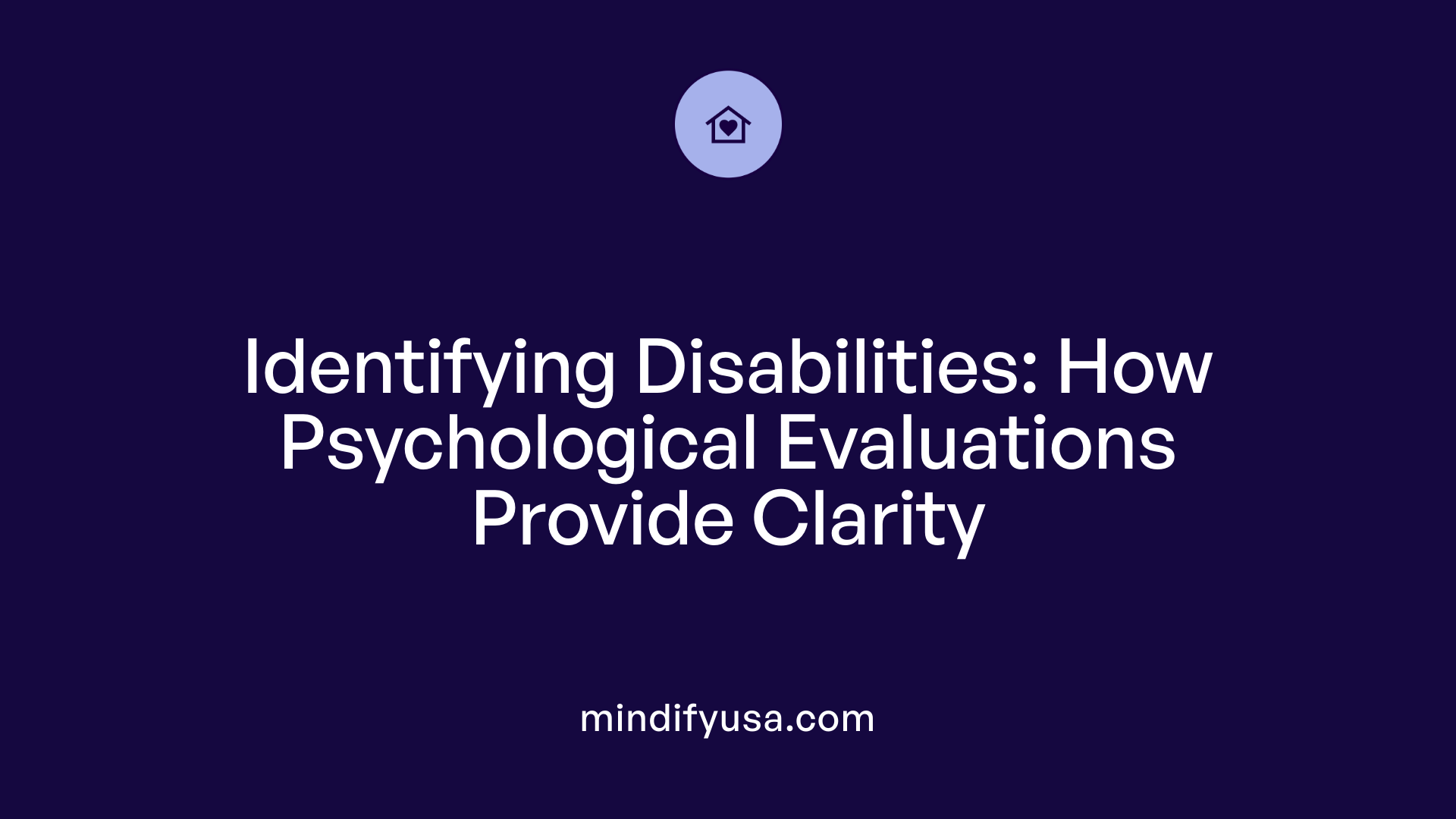 Psychological evaluations play a vital role in the process of identifying disabilities for students who may need special education services. These assessments provide detailed insights into various aspects of a child's functioning, including cognitive, emotional, and behavioral areas. By examining these facets, educators and specialists can better understand a student's strengths and challenges.
Psychological evaluations play a vital role in the process of identifying disabilities for students who may need special education services. These assessments provide detailed insights into various aspects of a child's functioning, including cognitive, emotional, and behavioral areas. By examining these facets, educators and specialists can better understand a student's strengths and challenges.
Standardized tests such as IQ assessments, academic achievement tests, and social-emotional measures are commonly used in evaluations. These assessments help determine if a student's difficulties are related to specific disabilities and help establish how impairments affect their learning and behavior.
The evaluation process relies on comprehensive data collection. This includes reviewing existing records, conducting interviews with parents and teachers, observing behaviors in different settings, and administering formal tests. All assessments are performed by qualified psychologists or other trained professionals, ensuring the reliability and accuracy of the results.
Results from psychological evaluations are critical for determining a child's eligibility under IDEA criteria. They guide teams of educators, parents, and specialists in making informed decisions about whether the student qualifies for special education services.
Furthermore, assessment findings help shape individual education plan (IEP) goals. They ensure that strategies and accommodations are tailored to meet the child's needs. Overall, psychological evaluations are a comprehensive, objective component of the multi-faceted assessment process that supports students with disabilities in reaching their full potential.
This process emphasizes that evaluations are not simply about diagnosis but also about understanding the educational impact of disabilities, enabling appropriate support and interventions for each child.
For more information on the contribution of psychological evaluations in disability identification, search using the phrase "contribution of psychological evaluations in disability identification."
Legal Rights and Procedural Safeguards in Psychological Testing
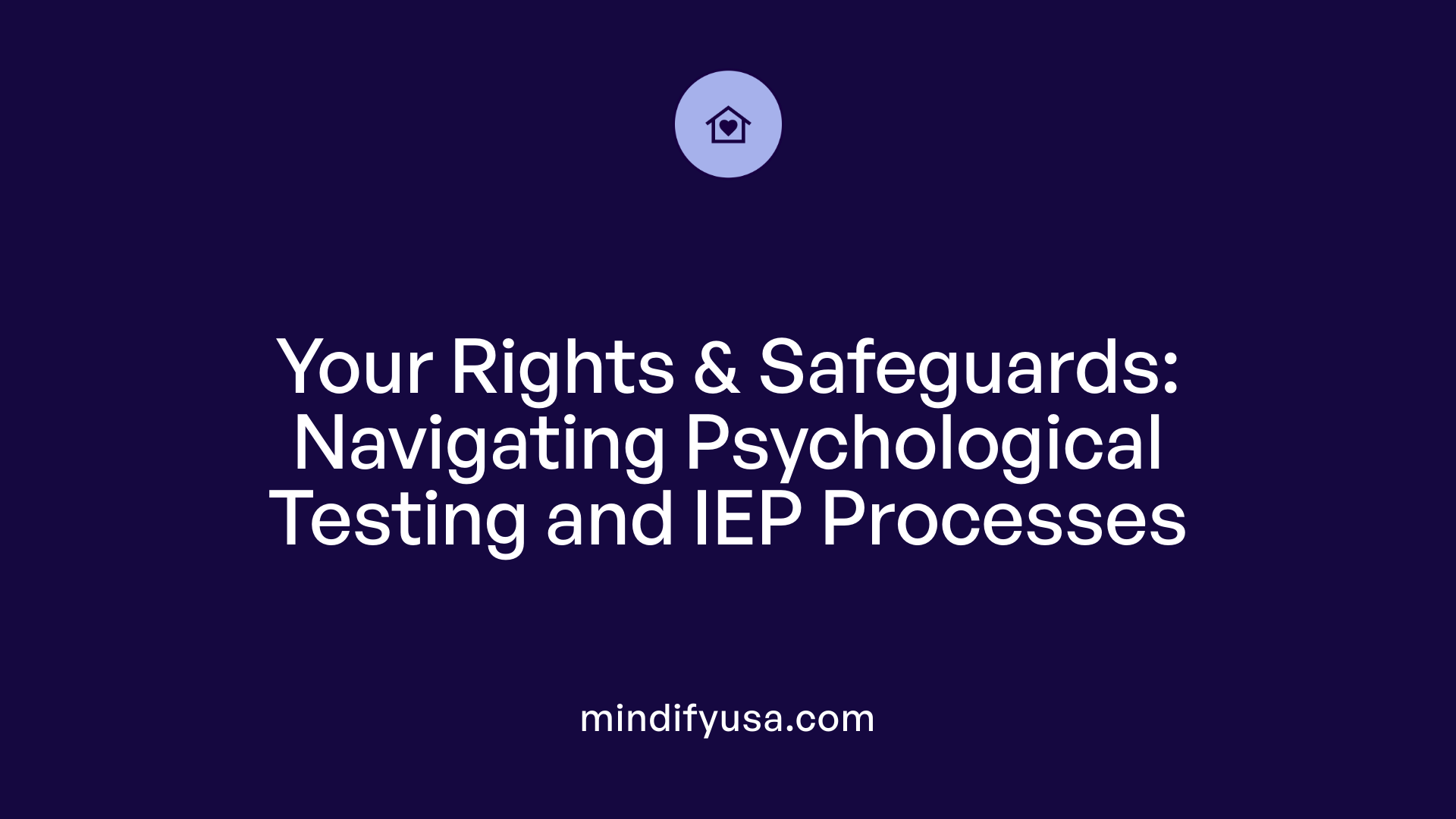
What rights and procedural steps are involved in psychological testing for IEP determination?
Parents hold significant rights when it comes to their child's psychological evaluation for special education eligibility. They can request an evaluation at any time by submitting a written request to the school, such as to the principal or the director of education. Once the request is made, schools typically have up to 60 days to conduct the assessment and make a determination about eligibility.
Before any evaluation begins, parental consent is necessary. Parents must be fully informed about the purpose of the assessment, what it involves, and how the results will be used. They can refuse or withdraw consent at any point, and their decision is protected under federal laws like the IDEA.
The evaluation process must be thorough and include a variety of assessment tools to determine the child's needs accurately. It involves gathering input from multiple sources including parents, teachers, and specialists. Procedures safeguards ensure that testing is fair and that results are communicated clearly, including what they imply for the child's educational placement.
Evaluation results guide the development of an IEP, and reevaluations are required at least every three years, or sooner if needed. If parents disagree with the school's evaluation findings or the eligibility decision, they have the right to seek an independent educational evaluation (IEE). They can also access dispute resolution options such as mediation or due process hearings, which provide formal avenues to resolve disagreements.
This process emphasizes the child's right to a free, appropriate public education while respecting parental involvement and oversight.
Additional details
| Aspect | Details | Relevant Law/Guideline |
|---|---|---|
| Parental rights | Request evaluations, participate in decisions, access IEE | IDEA, Section 300.503 |
| Consent procedures | Written consent required, can be withdrawn | IDEA, Section 300.300 |
| Timelines | Up to 60 days for evaluation, reevaluation every 3 years | IDEA, Section 300.303 |
| Dispute options | Independent evaluations, mediation, due process | IDEA, Sections 300.502-300.515 |
Understanding these rights helps parents actively participate in their child's educational planning and ensure assessments are fair and accurate.
Neuropsychological Testing and Its Relevance to IEP Eligibility
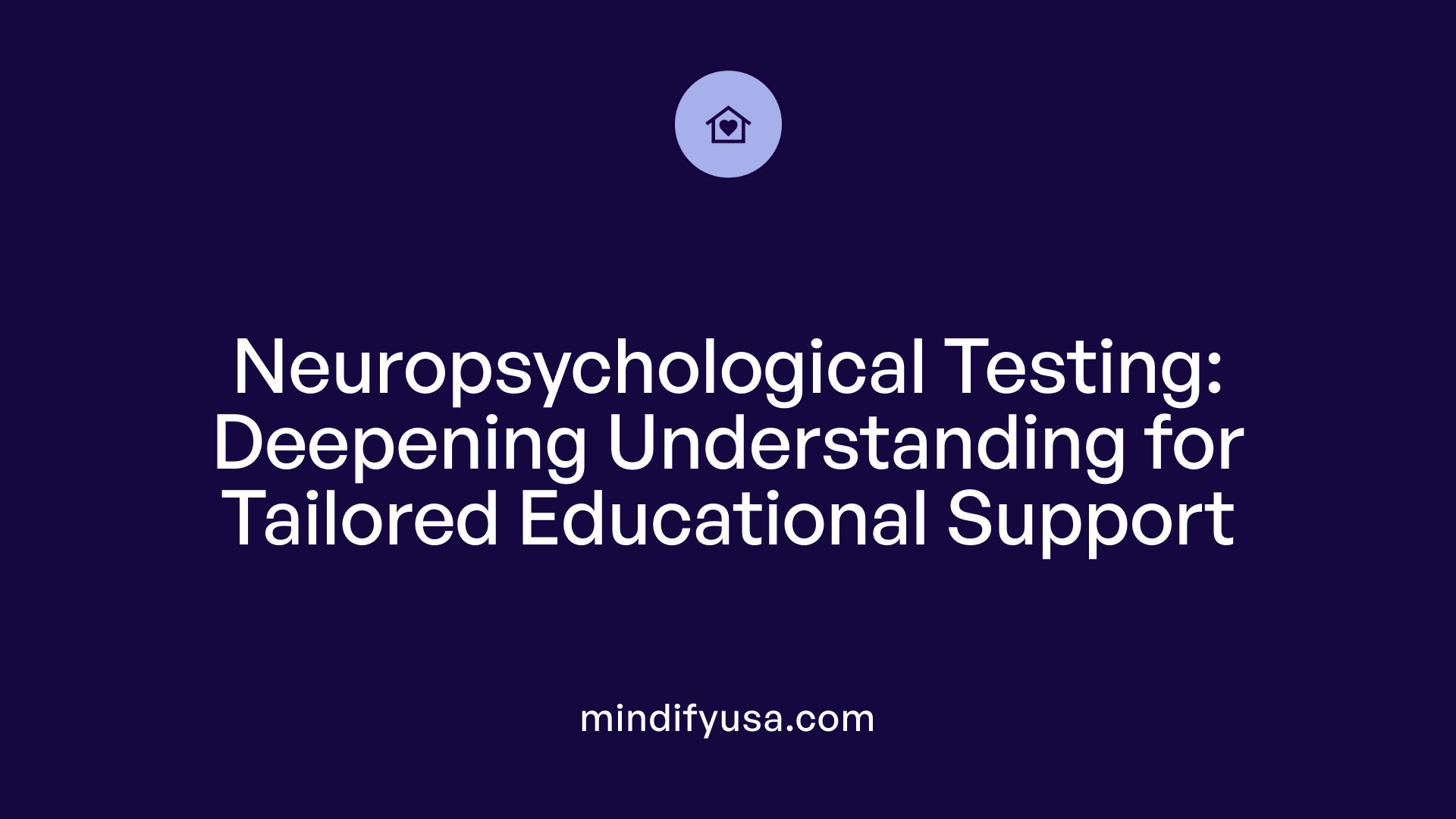
When is neuropsychological testing necessary for IEP eligibility?
Neuropsychological testing is not a mandatory requirement for qualifying a child for an Individualized Education Program (IEP). Instead, it serves as a supplementary tool that parents and professionals can request to gain a detailed understanding of a child's cognitive, behavioral, and emotional functioning.
This type of assessment is especially useful in complex cases. For example, children with suspected learning disabilities, autism spectrum disorder, ADHD, or traumatic brain injuries often benefit from neuropsychological evaluations. These assessments provide insights into specific brain-behavior relationships, helping to identify underlying causes of learning or behavioral difficulties.
While school-based evaluations primarily focus on establishing eligibility for special education services, neuropsychological assessments offer a deeper look into a child's unique strengths and challenges. They can inform tailored intervention strategies and support planning for educational and behavioral needs.
Parents might pursue private neuropsychological testing if they seek comprehensive information about their child's functioning. Although the results can be considered by the IEP team during eligibility decisions, such testing does not automatically determine whether a child qualifies for services.
Ultimately, neuropsychological testing is a valuable resource for understanding a child's individual needs and guiding effective interventions. However, it remains an optional step in the evaluation process, not a legal requirement for IEP eligibility.
| Aspect | Details | Additional Information |
|---|---|---|
| When is it necessary? | Often in complex cases involving specific conditions | Autism, ADHD, traumatic brain injury |
| Used for | Understanding brain-behavior relationships and guiding interventions | Not a required element for eligibility |
| Who requests | Parents or professionals | Usually private assessments, but can inform school evaluations |
| Does it guarantee eligibility? | No | Results are part of broader assessments |
| Role in process | Supports understanding of child's needs | Designed to complement other evaluation tools |
| Final decision | Made by the IEP team considering all information | Neuropsychological results are one piece of the puzzle |
Informing Parents and Guardians Through Testing Results
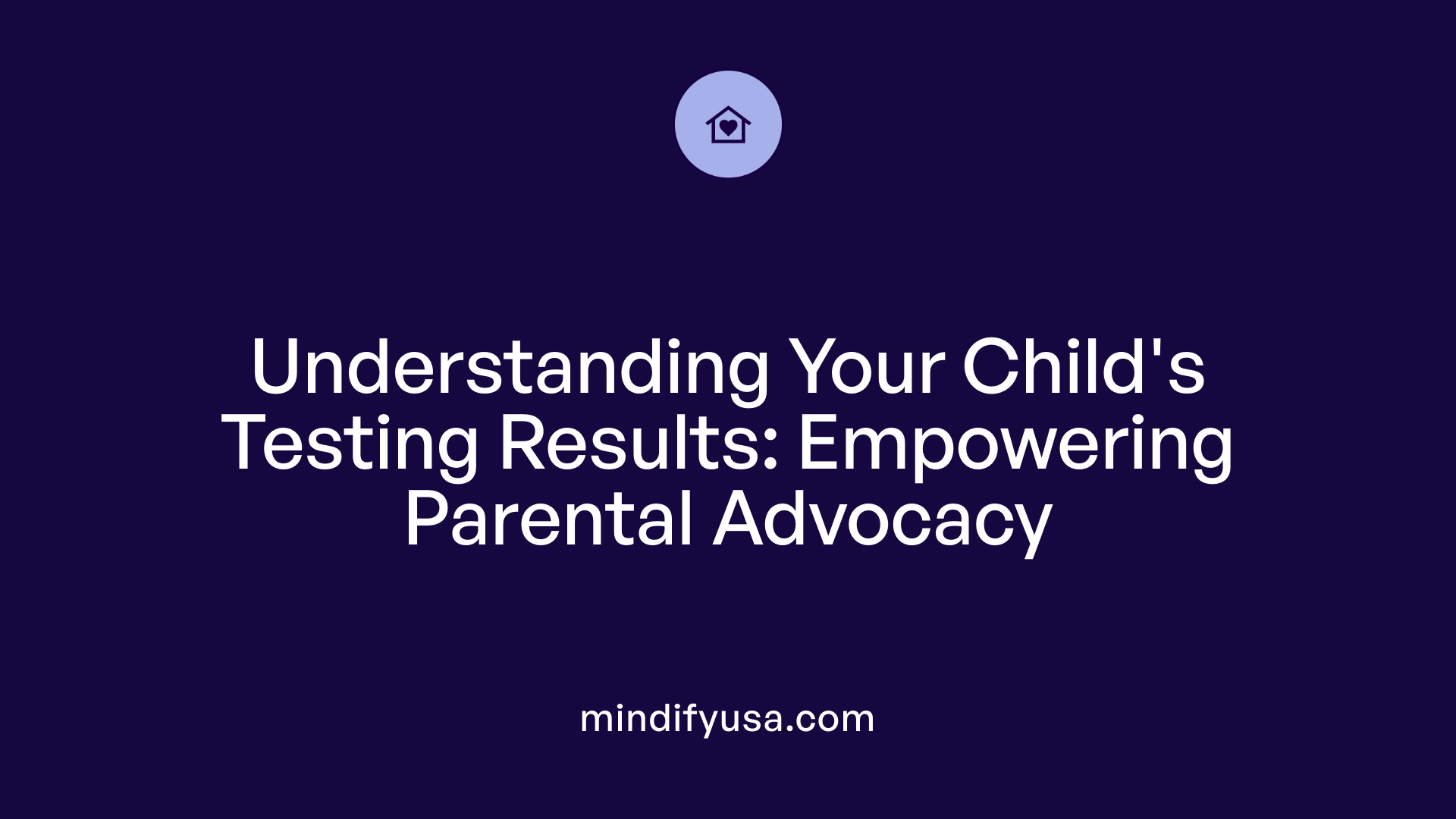
How do psychological testing results inform parents and guardians about their child's educational needs?
Psychological testing results give parents and guardians a detailed understanding of their child's strengths and weaknesses across various areas. These assessments, performed by qualified professionals, include a range of tests that examine academic skills, emotional health, social behaviors, and overall cognitive functioning.
Through analysis of scores and clinical observations, parents gain a clearer picture of what might be affecting their child's ability to learn or behave appropriately. For instance, a child’s performance on IQ tests, achievement tests, and behavioral assessments can highlight specific learning difficulties, emotional challenges, or developmental delays.
Having this information enables parents to better identify underlying issues that could be impacting school performance. It also helps them collaborate effectively with teachers and school staff to develop targeted support strategies.
The insights from private or comprehensive evaluations often form the basis for crafting personalized education plans, including IEPs or 504 Plans, which provide accommodations and resources specific to the child's needs. These plans can address issues like attention deficits, learning disabilities, or emotional disturbances.
Ultimately, understanding test results empowers parents to advocate for appropriate services. They can ensure their child's unique learning and emotional needs are recognized and met, leading to more effective interventions and a supportive educational environment.
This process of evaluating and understanding is crucial for fostering a child's academic success and emotional well-being, allowing families to make informed decisions about their child's ongoing development and support services.
| Area Assessed | Types of Tests/Assessments | How It Supports Parents |
|---|---|---|
| Cognitive abilities | IQ and neuropsychological tests | Identify learning strengths and possible disabilities |
| Academic skills | achievement tests in reading, math, writing | Pinpoint specific academic difficulties |
| Emotional health | social-emotional assessments | Understand emotional or behavioral challenges |
| Behavioral patterns | behavioral checklists and observations | Recognize behavioral issues impacting learning |
| Communication | speech and language assessments | Detect communication for speech delay or language impairment |
Understanding comprehensive evaluation results helps parents support their child's educational journey effectively, ensuring that interventions are tailored and appropriate.
Summary and Final Thoughts
Psychological tests are an integral part of the evaluation process for determining IEP eligibility. They provide essential, objective data about a child's cognitive, emotional, and behavioral functioning, helping to ensure that eligibility decisions are based on thorough and reliable evidence. While not mandatory, private assessments can offer additional perspectives, especially in complex cases. The evaluation process is guided by legal rights and procedural safeguards that protect parents and children, guaranteeing fair assessments and opportunities for dispute resolution. Ultimately, these assessments support the creation of effective, individualized educational plans that meet each child's unique needs. Recognizing the value of psychological testing helps educators and parents work together to promote educational success and emotional well-being for students with disabilities.
References
- Psychological Testing and IEPs: What Parents Need to Know
- How do I get my school-aged child evaluated for services?
- Determining Whether a Child is Eligible for Special ...
- Is Neuropsychological Testing Necessary for My Child to ...
- Right to an Evaluation of a Child for Special Education ...
- The IEP Eligibility Evaluation
- School Versus Private Psychoeducational Evaluations





































































































